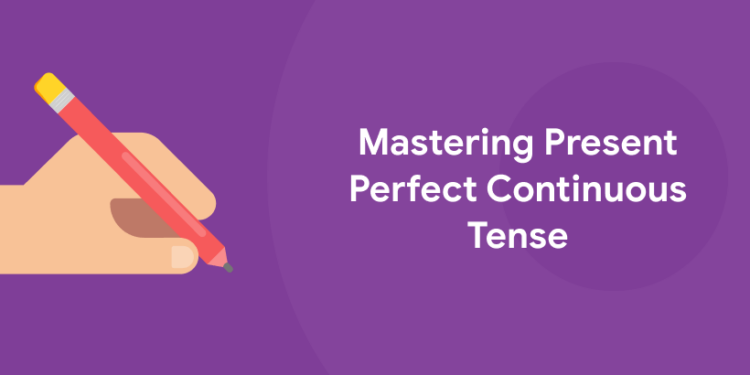The present perfect continuous tense is a vital aspect of English grammar, often tested in exams to assess language proficiency. Whether you’re a student preparing for an English exam or someone looking to enhance their language skills, understanding and mastering this tense is crucial. In this article, we will delve into the significance of the present perfect continuous tense, providing you with valuable insights, usage examples, exercises and tips to excel in your exams.
Present Perfect Continuous Tense: Exam Guide
The present perfect continuous tense, also known as the present perfect progressive tense, is used to express actions that started in the past, continue in the present, and might continue into the future. This tense is constructed using the auxiliary verb “have” (in its present perfect form) combined with “been” and the present participle (-ing form) of the main verb.
Elevate your speaking skills with our Spoken English Course! Get Free Demo Here!
Usage and Examples:
- Ongoing Actions: This tense is employed to describe actions that started in the past and are still ongoing. For example, “She has been studying English for three years.”
- Temporary Situations: It’s used to indicate temporary situations. “He’s been working in London for the past month.”
- Repetitive Actions: It can convey repetitive or habitual actions in the recent past. “They’ve been meeting every Sunday.”
- Cause and Effect: It’s used to explain the cause of something in the present. “I can’t come to the party because I’ve been feeling unwell.”
Present Perfect Continuous Tense Exercises:
Exercise 1: Fill in the Blanks
Fill in the blanks with the appropriate form of the present perfect continuous tense.
- She _______________ (study) for her exams since morning.
- They _______________ (wait) for the bus for over half an hour.
- I can’t come to the phone right now. I _______________ (cook) dinner.
- How long _______________ (you/play) the guitar?
- The team _______________ (train) hard for the upcoming match.
- I’m sorry I’m late. I _______________ (work) on a project at the office.
- He looks tired. He _______________ (work) in the garden all day.
- We _______________ (live) in this city for two years now.
- The children _______________ (play) outside since the morning.
- Sarah _______________ (study) French for a year.
Exercise 2: Choose the Correct Option
Choose the correct option to complete each sentence.
- I _______________ (have) a headache all day.
a) have been having
b) have had
c) had been having - She _______________ (wait) for her friend for two hours.
a) is waiting
b) has been waiting
c) had been waiting - They _______________ (paint) the house since last week.
a) painted
b) have been painting
c) have painted - How long _______________ (you/work) on this project?
a) have you worked
b) have you been working
c) did you work - He’s exhausted because he _______________ (run) a marathon.
a) runs
b) has been running
c) had been running
Exercise 3: Rewrite the Sentences
Rewrite the sentences using the present perfect continuous tense.
- They started writing the novel two months ago. (for)
- She began learning Spanish last year. (since)
- I started reading this book an hour ago. (for)
- He began practicing the piano five years ago. (since)
- We started working on the project two weeks ago. (for)
Join our Spoken English program today and communicate with ease!
Answers:
Exercise 1: Fill in the Blanks
- has been studying
- have been waiting
- am cooking
- have you been playing
- has been training
- have been working
- has been working
- have been living
- have been playing
- has been studying
Exercise 2: Choose the Correct Option
- a) have been having
- b) have been waiting
- b) have been painting
- b) have you been working
- b) has been running
Exercise 3: Rewrite the Sentences
- They have been writing the novel for two months.
- She has been learning Spanish since last year.
- I have been reading this book for an hour.
- He has been practicing the piano for five years.
- We have been working on the project for two weeks.
Tips for Mastering the Present Perfect Continuous Tense
- Recognize Time Frames: Pay attention to time expressions like “for,” which indicates the duration of the action, and “since,” which denotes the starting point of the action.
- Context Matters: Consider the context of the sentence to determine whether the present perfect continuous tense is the most appropriate choice.
- Contrast with Present Perfect Simple: Differentiate between the present perfect continuous and present perfect simple tenses. The continuous tense emphasizes the duration and ongoing nature of the action.
- Practice Regularly: Use exercises and writing prompts to practice constructing sentences in the present perfect continuous tense. The more you practice, the more confident you’ll become.
- Read and Listen: Engage with English texts, articles, and conversations to observe how native speakers use this tense naturally.
Conclusion:
The present perfect continuous tense adds depth and precision to your English communication. By mastering this tense, you’ll be better equipped to convey actions and situations that span across time. Remember, consistent practice and exposure to various contexts will enhance your command of this tense. As you prepare for your language exams, let this guide be your companion in unraveling the intricacies of the present perfect continuous tense. Your linguistic journey towards success starts now.










